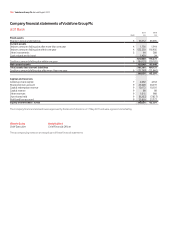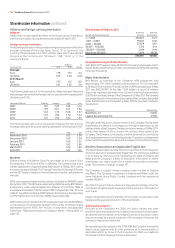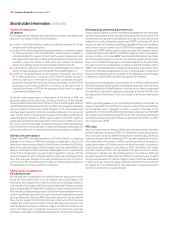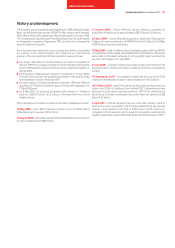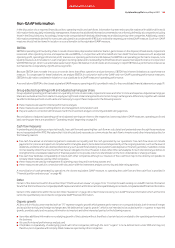Vodafone 2011 Annual Report Download - page 138
Download and view the complete annual report
Please find page 138 of the 2011 Vodafone annual report below. You can navigate through the pages in the report by either clicking on the pages listed below, or by using the keyword search tool below to find specific information within the annual report.136 Vodafone Group Plc Annual Report 2011
Shareholder information continued
General meetings and notices
Subject to the articles of association, annual general meetings are held at
such times and place as determined by the directors of the Company. The
directors may also, when they think fit, convene other general meetings of
the Company. General meetings may also be convened on requisition as
provided by the Companies Act 2006.
An annual general meeting needs to be called by not less than 21 days’
notice in writing. Subject to obtaining shareholder approval on an annual
basis, the Company may call other general meetings on 14 days’ notice. The
directors may determine that persons entitled to receive notices of meetings
are those persons entered on the register at the close of business on a day
determined by the directors but not later than twenty-one days before the
date the relevant notice is sent. The notice may also specify the record date,
the time of which shall be determined in accordance with the articles of
association and the Companies Act 2006.
Shareholders must provide the Company with an address or (so far as the
Companies Act 2006 allows) an electronic address or fax number in the
United Kingdom in order to be entitled to receive notices of shareholders’
meetings and other notices and documents. In certain circumstances the
Company may give notices to shareholders by publication on the Company’s
website and advertisement in newspapers in the United Kingdom. Holders
of the Company’s ADSs are entitled to receive notices under the terms of the
deposit agreement relating to the ADSs.
Under Section 336 of the Companies Act 2006 the annual general meeting
of shareholders must be held each calendar year and within six months of
the Company’s year end.
Electronic communications
The Company has previously passed a resolution allowing it to communicate
all shareholder information by electronic means, including making such
information available on the Company’s website. Those shareholders who
have positively elected for website communication (or are deemed to have
consented to receive electronic communication in accordance with the
Companies Act 2006) will receive written notification whenever shareholder
documentation is made available on the website.
Variation of rights
If at any time the Company’s share capital is divided into different classes of
shares, the rights attached to any class may be varied, subject to the
provisions of the Companies Act 2006, either with the consent in writing of
the holders of three quarters in nominal value of the shares of that class or
at a separate meeting of the holders of the shares of that class.
At every such separate meeting all of the provisions of the articles of
association relating to proceedings at a general meeting apply, except that
i) the quorum is to be the number of persons (which must be at least two)
who hold or represent by proxy not less than one third in nominal value of
the issued shares of the class or, if such quorum is not present on an
adjourned meeting, one person who holds shares of the class regardless of
the number of shares he holds, ii) any person present in person or by proxy
may demand a poll and iii) each shareholder will have one vote per share
held in that particular class in the event a poll is taken. Class rights are
deemed not to have been varied by the creation or issue of new shares
ranking equally with or subsequent to that class of shares in sharing in profits
or assets of the Company or by a redemption or repurchase of the shares by
the Company.
Limitations on voting and shareholding
As far as the Company is aware there are no limitations imposed on the
transfer, holding or voting of the Company’s ordinary shares other than
those limitations that would generally apply to all of the shareholders. No
shareholder has any securities carrying special rights with regard to control
of the Company.
Liquidation rights
In the event of the liquidation of the Company, after payment of all liabilities
and deductions in accordance with English law, the holders of the
Company’s 7% cumulative fixed rate shares would be entitled to a sum equal
to the capital paid up on such shares, together with certain dividend
payments, in priority to holders of the Company’s ordinary shares. The
holders of the fixed rate shares do not have any other right to share in the
Company’s surplus assets.
Pre-emptive rights and new issues of shares
Under Section 549 of the Companies Act 2006 directors are, with certain
exceptions, unable to allot the Company’s ordinary shares or securities
convertible into the Company’s ordinary shares without the authority of the
shareholders in a general meeting. In addition, Section 561 of the Companies
Act 2006 imposes further restrictions on the issue of equity securities (as
defined in the Companies Act 2006 which include the Company’s ordinary
shares and securities convertible into ordinary shares) which are, or are to
be, paid up wholly in cash and not first offered to existing shareholders. The
Company’s articles of association allow shareholders to authorise directors
for a period specified in the relevant resolution to allot i) relevant securities
generally up to an amount fixed by the shareholders and ii) equity securities
for cash other than in connection with a pre-emptive offer up to an amount
specified by the shareholders and free of the pre-emption restriction in
Section 561. At the AGM in 2010 the amount of relevant securities fixed by
shareholders under (i) above and the amount of equity securities specified
by shareholders under (ii) above were both in line with corporate governance
guidelines. The directors consider it desirable to have the maximum
flexibility permitted by corporate governance guidelines to respond to
market developments and to enable allotments to take place to finance
business opportunities as they arise. In order to retain such maximum
flexibility, the directors propose to renew the authorities granted by
shareholders in 2010 at this year’s AGM. Further details of such proposals
are provided in the 2011 notice of AGM.
Disclosure of interests in the Company’s shares
There are no provisions in the articles of association whereby persons
acquiring, holding or disposing of a certain percentage of the Company’s
shares are required to make disclosure of their ownership percentage
although such requirements exist under rules derived from the Disclosure
and Transparency Rules (‘DTRs’).
The basic disclosure requirement upon a person acquiring or disposing
of shares that are admitted to trading on a regulated market and
carrying voting rights is an obligation to provide written notification to the
Company, including certain details as set out in DTR 5, where the percentage
of the person’s voting rights which he holds as shareholder or through his
direct or indirect holding of financial instruments (falling within DTR 5.3.1R)
reaches or exceeds 3% and reaches, exceeds or falls below each 1%
threshold thereafter.
Under Section 793 of the Companies Act 2006 the Company may, by notice
in writing, require a person that the Company knows or has reasonable
cause to believe is, or was during the preceding three years, interested in the
Company’s shares to indicate whether or not that is correct and, if that
person does or did hold an interest in the Company’s shares, to provide
certain information as set out in the Companies Act 2006. DTR 3 deals with
the disclosure by persons “discharging managerial responsibility” and their
connected persons of the occurrence of all transactions conducted on their
account in the shares of the Company. Part 28 of The Companies Act 2006
sets out the statutory functions of the Panel on Takeovers & Mergers (the
‘Panel’). The Panel is responsible for issuing and administering the Code on
Takeovers & Mergers which includes disclosure requirements on all parties
to a takeover with regard to dealings in the securities of an offeror or offeree
company and also on their respective associates during the course of an
offer period.


